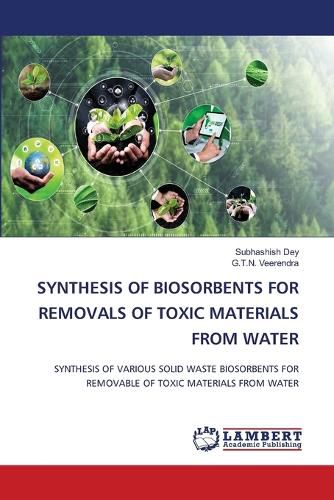Readings Newsletter
Become a Readings Member to make your shopping experience even easier.
Sign in or sign up for free!
You’re not far away from qualifying for FREE standard shipping within Australia
You’ve qualified for FREE standard shipping within Australia
The cart is loading…






The synthesis of solid waste biosorbents for water remediation involves repurposing various discarded materials to create efficient and sustainable solutions. Through innovative approaches, waste materials like agricultural residues, industrial byproducts, and biomass are transformed into biosorbents capable of removing toxic contaminants from water sources. This process contributes to both waste management and environmental protection. The abstract explores the diverse sources of biosorbents, highlighting their cost-effectiveness and ecofriendliness. The study delves into the synthesis methods, emphasizing the importance of optimizing conditions for enhanced sorption capacities. The biosorbents' structural and chemical characteristics play a pivotal role in their ability to adsorb a wide range of pollutants.The abstract underscores the significance of understanding kinetics, isotherms, and thermodynamics in evaluating biosorbent performance. Furthermore, the research discusses the potential application of these biosorbents in real-world scenarios, addressing challenges and proposing scalable solutions for large-scale water treatment.
$9.00 standard shipping within Australia
FREE standard shipping within Australia for orders over $100.00
Express & International shipping calculated at checkout
The synthesis of solid waste biosorbents for water remediation involves repurposing various discarded materials to create efficient and sustainable solutions. Through innovative approaches, waste materials like agricultural residues, industrial byproducts, and biomass are transformed into biosorbents capable of removing toxic contaminants from water sources. This process contributes to both waste management and environmental protection. The abstract explores the diverse sources of biosorbents, highlighting their cost-effectiveness and ecofriendliness. The study delves into the synthesis methods, emphasizing the importance of optimizing conditions for enhanced sorption capacities. The biosorbents' structural and chemical characteristics play a pivotal role in their ability to adsorb a wide range of pollutants.The abstract underscores the significance of understanding kinetics, isotherms, and thermodynamics in evaluating biosorbent performance. Furthermore, the research discusses the potential application of these biosorbents in real-world scenarios, addressing challenges and proposing scalable solutions for large-scale water treatment.